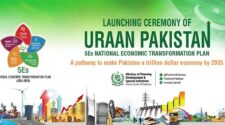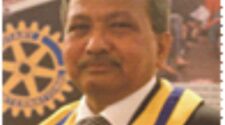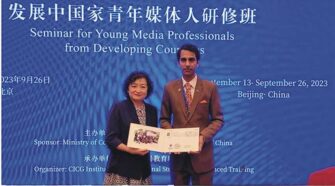By Abed Akbari
Tehran, IRNA – Cultural diplomacy is the most important tool which can be used to expand soft
power and, as a result, expand ties between Iran and its neighboring countries, including
Pakistan. Promoting the level of cooperation with regional countries will, subsequently, provide
more room for convergence in foreign policy.
As reported by the Foreign Policy Department of IRNA, the Managing Director of Tehran
International Studies & Research Institute (TISRI), Abed Akbari, has highlighted the importance
of cultural diplomacy between Iran and Pakistan for regional convergence by proposing the
making a film on the life of the prominent Pakistani politician, “Benazir Bhutto”.
The complete text of the note is as follows:
Apart from being neighbors, Iran and Pakistan have always maintained a level of historical,
cultural, political, and economic ties under any and all circumstances. Be that as it may, the ties
between the two countries have somewhat lagged given their reciprocal relations and ample
capacities. In the meantime, by putting all the diplomatic capacities to work, particularly in
cultural diplomacy by virtue of public diplomacy, ties between the two countries can become
an essential factor not to be discounted.
The ever-expanding communication technologies, importance of public opinion, soft power
replacing hard power, and diplomatic upheavals from traditional to modern, have given rise to
the concept of public diplomacy for governments to attain their objectives abroad. Currently,
governments are making efforts to converge the three parts of cultural exchanges, cultural
diplomacy, and media broadcast as part of public diplomacy to align public opinion for a better
achievement of their political goals.
Public diplomacy is the interaction of politics and culture at different levels. In other words,
public diplomacy is a cultural aspect of politics. For this reason, culture as an important factor
of soft diplomacy forms the basis of public diplomacy. As an element of public diplomacy,
cultural diplomacy involves the cinema, theater, literature, and music to project a positive
image of a country and its people among its foreign audiences worldwide.
Throughout the 20 th century and beyond, the silver screen has been a most influential and
accessible media in cultural diplomacy, with a singular aptitude to influence the masses across
the world. Some films in particular have not only entertained their audiences, they have also
succeeded in promoting cultural diplomacy through education, strengthening ties, overcoming
clichés, and going beyond borders at various levels.
Hence, public diplomacy and therefore cultural diplomacy are the most important tools which
can be used to expand soft power and promote ties between Iran and its neighboring counties,
including Pakistan. As levels of cooperation grow among regional countries, convergence in
foreign policy can grow by the same token.
To achieve this, the idea of making a film or television series as a joint venture between Iran
and Pakistan about the life of “Benazir Bhutto”, who was a prominent Pakistani politician and
the first woman in history to become the prime minister of an Islamic country, can be of
significant value. Especially as the peaks and troughs of her life have a great potential for a film
project.
The life of Ms Bhutto can be portrayed as an amalgamation of an exiled princess, political
prisoner, and most importantly as the first woman to head a government in a Muslim country.
Benazir Bhutto was assassinated at the age of 54. She was the fourth member of her family who
was murdered on the stage of political struggles in Pakistan. Her father, Zulfikar Ali Bhutto, was
the President of Pakistan (1971-1973) and subsequently the Prime Minister of his country
(1971-1977). He was the founder of Pakistan Peoples Party (PPP), but was removed in a coup by
his appointee as the Chief of Army Staff, General Muhammad Zia-ul-Haq, and hanged in 1979.
Her youngest brother, Shahnawaz, died mysteriously of poisoning in 1985. Her other brother,
Morteza, was also killed under suspicious circumstances in 1996.
As leader of the PPP, Benazir Bhutto had a charismatic personality and ran the party as the
representative of democratic ideals. Ms Bhutto was elected twice as the PPP leader and prime
minister of Pakistan. She was ousted from power both times and spent many years in exile.
Bhutto's view on Islam as an open, pluralistic, and tolerant religion was quite evident. She
believed that not only Islam, but also other Abrahamic religions such as Judaism and
Christianity have been abused by extremists and fanatics. The making of a movie on the life of
Ms Bhutto as a joint venture can provide a benchmark for her views and provide an opportunity
for Iran and Pakistan to cooperate closely in a cultural project.
Following the recent crisis in Pakistan in particular, leading to a vote of no confidence for Imran
Khan in the Pakistani Parliament on 9 April 2022, Shahbaz Sharif was selected as the 23 rd Prime
Minister of Pakistan by Parliament. He proceeded to appoint Bilawal Bhutto Zardari as his
Foreign Minister. Many believe that this appointment can serve as the last step for him to reach
the highest position in the country.
At the age of 33, Bhutto is the youngest foreign minister in the world, the son of former Prime
Minister Benazir Bhutto and former President Asif Ali Zardari, and the grandson of former
Prime Minister Zulfikar Ali Bhutto. This can be considered as another factor in facilitating the
progress of the above-mentioned project.












